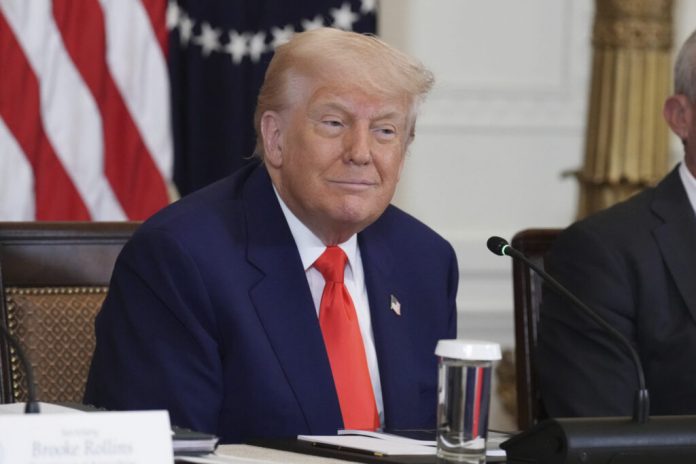U.S. President Donald Trump has ramped up tariff threats in a dramatic escalation of trade tensions with the European Union. As negotiations stall, Trump is proposing a 50% tariff on all EU imports and a 25% levy on Apple iPhones produced outside the United States, a bold move signaling mounting frustration and a hardening U.S. trade stance.
The proposed measures, which Trump said would take effect from June 1, signal a hardline stance in stalled negotiations with EU officials.
Trump’s aggressive rhetoric, shared via social media, reflects his broader effort to reduce America’s trade deficit and push for domestic manufacturing.
READ ALSO, Kogi First Lady Backs Education, Child Welfare Initiatives
He argued that the EU has been “very difficult to deal with,” accusing the bloc of exploiting US markets while resisting fair trade practices.
The president also reiterated his long-standing criticism of Apple, warning the company must shift production to US soil or face significant import taxes.
Apple, which has recently diversified its production away from China to India and Vietnam, is in Trump’s crosshairs once again. Despite earlier exemptions granted to electronics, the president made it clear that foreign-made iPhones intended for the US market will now be subject to a minimum 25% tariff if manufacturing isn’t relocated domestically.
Trade experts suggest the president’s statements are more about gaining leverage ahead of key discussions than enforcing immediate policy. “There’s no executive order—yet,” said Aslak Berg of the Centre for European Reform, cautioning that the threats may simply be a negotiation tactic.
Nevertheless, financial markets reacted sharply, with US and EU stocks falling as investors processed the potential economic fallout.
The auto industry may be among the hardest hit. Volvo CEO Hakan Samuelsson warned that steep tariffs would likely be passed on to consumers and could jeopardize sales of models like the EX30 electric vehicle, currently built in Belgium.
Samuelsson remains hopeful for a resolution, stating, “It could not be in the interest of Europe or the US to shut down trade between them.”
US President Donald Trump has dramatically escalated trade tensions by recommending a 50% tariff on all European Union imports and a 25% levy on Apple iPhones manufactured outside the United States.
The proposed measures, which Trump said would take effect from June 1, signal a hardline stance in stalled negotiations with EU officials.
Trump’s aggressive rhetoric, shared via social media, reflects his broader effort to reduce America’s trade deficit and push for domestic manufacturing.
He argued that the EU has been “very difficult to deal with,” accusing the bloc of exploiting US markets while resisting fair trade practices.
The president also reiterated his long-standing criticism of Apple, warning the company must shift production to US soil or face significant import taxes.
Apple, which has recently diversified its production away from China to India and Vietnam, is in Trump’s crosshairs once again. Despite earlier exemptions granted to electronics, the president made it clear that foreign-made iPhones intended for the US market will now be subject to a minimum 25% tariff if manufacturing isn’t relocated domestically.
Trade experts suggest the president’s statements are more about gaining leverage ahead of key discussions than enforcing immediate policy. “There’s no executive order—yet,” said Aslak Berg of the Centre for European Reform, cautioning that the threats may simply be a negotiation tactic.
VIDEO; NEWS HOUR, KOGI GETS AFDB SUPPORT FOR CRITICAL INFRASTRUCTURE
Nevertheless, financial markets reacted sharply, with US and EU stocks falling as investors processed the potential economic fallout.
The auto industry may be among the hardest hit. Volvo CEO Hakan Samuelsson warned that steep tariffs would likely be passed on to consumers and could jeopardize sales of models like the EX30 electric vehicle, currently built in Belgium.
Samuelsson remains hopeful for a resolution, stating, “It could not be in the interest of Europe or the US to shut down trade between them.”




